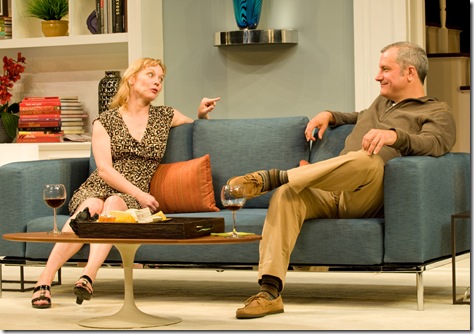INTERVIEW: Good People Director K. Todd Freeman
By Melody Udell in Arts & Entertainment on Oct 24, 2012 3:00PM

Good People at the Steppenwolf Theatre.
Chicagoist: What first struck you about Good People, and why did you choose to bring it to Chicago?
K. Todd Freeman: There are several things that hit me when I first read the play (in no specific order):
- It's humanity. It's about struggle. Essentially about an every(wo)man who is fighting to stay above water.
- It's about the choices we make on the journey of our lives and how those choices define how we are viewed by others, as either "good" people or "bad." And within that idea, why does it matter to us how we are viewed?
- It is about complicated people who are not easy to define. All of the characters have flaws and may not be so easily likable. Just like real life. It's not black and white. The lines are blurry and the people are complex. Especially Margie and Mike.
C: What about this play makes it so relatable to Chicagoans? To everyone?
KTF: It's because of the above reasons that this play is extremely relatable to anyone, anywhere. And I suppose that's why this play is being produced so much across the country. It is about the 47%. And I think it is now, perhaps, even more relevant now than it was when it was originally produced on Broadway two years ago.
C: The idea of leaving the neighborhood to make it on your own is nothing new, yet through the characters in the show, we realize it's not so simple as picking up and leaving. What is it about this theme that really resonates with the audience?
KTF: Yes, it's not so simple as picking up and leaving. Yet for some people it is exactly that simple. In the play, Margie credits luck for Mike's ability to pick up and leave. But he ascribes it to luck and an inevitability, his self-proclaimed prophecy from boyhood. And he achieved it. If we look back at our lives we can — hopefully with some objectivity — see where luck, fate, God and others played a part in the journey our lives have taken… that nothing is totally of our own doing. There actually is no such thing as a "self-made man."
C: You're a widely experienced actor both in and out of Chicago and an ensemble member at the Steppenwolf, so what compels you to put on your director hat?
KTF: Every now and then, a play will come down the pike that you love and relate to a great deal, yet there is no part in it for you, so you could never get a chance to work on that play. And with a percentage of those plays, for me, I get the feeling in my gut that I could direct. There's something in them that I'd like to communicate and share with an audience — something that strikes me so deeply that I feel others would gain something from sharing.
C: Is there any other work that you'd love to bring to Chicago?
KTF: There's nothing specifically that I have in my back pocket that I'm chomping at the bit to bring to production. Projects that I direct have seemed to just jump out at me. For instance, Martha Lavey, our artistic director, brought Good People to me. I read it and fell in love with it immediately. So we will just have see what comes next organically.